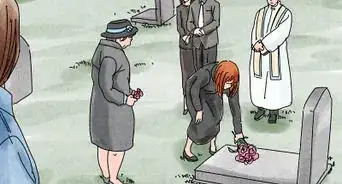This article was co-authored by John A. Lundin, PsyD. John Lundin, Psy. D. is a clinical psychologist with 20 years experience treating mental health issues. Dr. Lundin specializes in treating anxiety and mood issues in people of all ages. He received his Doctorate in Clinical Psychology from the Wright Institute, and he practices in San Francisco and Oakland in California's Bay Area.
This article has been viewed 134,612 times.
Grief can be caused by a variety of factors, from the loss of a loved one or a pet to the loss or failure of a cherished dream. Anyone can agree that coping with grief is a difficult and complicated process and that there's no convenient timeline you can follow to truly "get over" your grief. Still, if you manage your emotions to the best of your ability, get help and support, and remember to take care of yourself, you can slowly start to feel better.
Steps
Facing Your Feelings
-
1Don't ignore your grief. One myth people may have about facing grief is that if you ignore your feelings or sweep them under the rug, that they will simply go away. Sure, you can go on with your life, go to work, and act like nothing happened, but in the long run, this is only going to delay your pain and make you drag out all of the sad, bitter, angry, or hurt feelings that are welling up somewhere inside you. So, the first thing you should do is admit that you're in terrible pain. Admit it to yourself, to your friends, and to your support network, and then take it from there.
-
2Question yourself. Many times it is seen that the reason for grief is illogical, and irrational. For example some people grieve because of a habit of doing so as after when they are get over grief they feel better and triumphant. They even sometimes get addicted to this triumphant feeling after getting over their grief.So question yourself.
- Is this grief rational or logical? People sometimes grieve for something over which they have no control of, petty things, fake reasons, etc for example if a friend fails a test. Logically you have no control or influence over their friend's failure but still they will grief instead of supporting their friend in a productive way. Another example could be rejection in an interpersonal relationship, which is most of the time is complete nonsense. Remember, failure is a part of success.
- Is this reaction productive? Ask yourself, the grief you are feeling, is it in anyway going to help me to get over the source for the grief? would it have a positive effect on my life? If yes, by all means grieve, but if no, aren't you being irrational and hard on yourself? You are feeling miserable which is not going to get you anywhere.
- Can I do something about the grief? People sit there and grieve in a hope to get rescued and in the end it makes them even more sad and grievous. Instead of feeling miserable ask yourself; what can I do to fix it? if there is something which you can do about it, try to do it. However if there is nothing you can do to fix this, it would be irrational and you would be doing a huge disservice to yourself by feeling sad over which you have no control of.
Advertisement -
3Don't force yourself to be strong. Another thing people going through a great loss tell themselves is that they should put up a strong front. You may think that nobody wants to see you crying, looking sad, being barely able to take care of yourself, and just walking around like a sleepwalker, but it's okay to do that if that's really how you're feeling. If you have to stay strong for other friends or family members, then it can get tricky, but you can still admit that you're feeling weak if you're really devastated.
- Of course you don't want to completely fall apart, and you may not have to. But don't try to act "tough" or like you've got it all under control when you know that's not the case.
-
4Cry if you want to. There's no limit to how many tears a person can cry before they cease to be "productive." If you feel like crying, just get it all out of your system and cry again whenever you feel like it. Obviously, it's more convenient if you can cry mostly when you're not alone, and not fall victim to tears in public, but if you do, it's not the end of the world, and people will understand. Don't think that your tears are slowing you down or keeping you from moving forward.[1]
-
5Don't cry if you don't want to. Contrary to popular belief, not everybody experiences pain the same way -- and not through tears. You can feel a deep sadness without shedding a tear, even if the people around you might think it's "weird" that you're not expressing your feelings more openly. Everyone grieves differently, and don't force yourself to cry if that's not what you want to do.[2]
-
6Stop thinking about a timeline. Maybe you've heard that "grief only lasts a year" -- that doesn't sound so bad, right? Unfortunately, everyone has his or her own timeline when it comes to dealing with grief, and you shouldn't feel bad if you feel like months and months have gone by and you feel like you haven't made any "progress." It's not about progress -- it's about learning to face your feelings and seeing where they take you. People may have certain expectations for how you should be feeling at a certain point, but your own feelings should have nothing to do with what people want from you.
- The fact of the matter is, you'll never be able to fully "get over" your grief. You will be reminded of your loved one, even many years later, and that's perfectly normal. "Getting over" really means finding the best way to cope with your feelings so that you can move forward, which is different from "moving on."[3]
-
7Don't obsess over the five stages of grief. If you're grieving, then it's likely you've heard about how every person has to go through the five stages of grief -- denial, anger, bargaining, depression, and acceptance. However, not everyone goes through all of these five stages before he or she finds peace, and not everyone goes through them in the same order, either. For example, you may feel depression first, followed by anger. If you are going through these stages, it can help to know that other people feel the same way, but don't think that you can't deal with your grief because you haven't "reached" all of the stages.[4]
Getting Support
-
1Lean on your family and friends. That's what they're there for, isn't it? Your friends and family aren't just there for the fun times or the holidays. They are there to be a shoulder to cry on, and to lend you a kind ear and helping hand when you need one. Open up to a close friend or family member about your pain, and make a habit of hanging out with your loved ones in relaxed/low-pressure settings. Some things such as going to loud parties with your loved ones may stress you out and make you feel worse, but watching a movie or sharing a meal with a close friend can make you feel better.[5]
- If you need a lot of alone time, that's okay. Don't force yourself to be social if you don't want to be. But if you feel like you don't want to be around other people at all, then you can run into trouble.
- If hanging out with close friends really does have a soothing effect, then make a plan to spend even more time with them and to make your social calendar a bit busier than normal.
-
2Find comfort in your faith. If you do adhere to a specific religion, then this can be the time to get even more invested in your faith and your religious community. Talk to your pastor, rabbi, imam, or other religious leaders to find comfort and attend services and events held by your religious group. You can meet new people who offer comfort or just spend more time focusing on your faith and your religious beliefs, which will lead you to comfort as well.
-
3Join a support group. Support groups are filled with people who are suffering from similar losses and who can share their pain and understand yours. You may feel that you don't have many friends or family members to turn to because they don't know what you're really going through because they have never suffered a similar loss, no matter how well-meaning they may be. Support groups can give you access to people who are suffering in a similar way (though of course, no one can feel the exact same pain as any other person) and can help you build a new routine and get the help you need.
- Support groups aren't for everybody. If you join one and just don't feel like it's making an impact, it's okay to leave, too.
-
4Get help from a therapist or a grief counsellor. Sometimes, it can be a big help to share your feelings with a professional who doesn't know you on a personal level. This can help you sort out your feelings and to get more advice from a trusted source. You may also just want to talk and can feel less restricted if you're sharing your feelings with a person who doesn't know you outside of his or her office. Don't think that getting professional help means you have problems or that you're weak; it's a sign of strength to admit that you need further help.[6]
- Don't worry about making people feel a little more awkward or uncomfortable around you; that's only a small risk, and it's much better to put it all out in the open instead of struggling to smile through a difficult work day when you can barely force yourself to open your email.
-
5Consider getting a pet. This may sound ridiculous. How can a tiny little kitty make you feel better about the death of one of your closest friends? Obviously, a new pet can't replace the person that you lost, but having a pet -- if you feel stable enough to take care of it, of course -- can make you feel better for sure. You'll find comfort in being able to cuddle with a creature who loves you unconditionally and will feel strength from being able to care for another being. Pets are shown to relieve stress, and that may be another thing you need.
Taking Care of Yourself
-
1Get some rest. It may sound silly to make sure you get 7-8 hours of sleep a day, but this is one of the most important things you can do to take care of yourself during this difficult time. Chances are, you're staying up all night worrying, or you may be spending over 14 hours a day in bed because you can't make yourself get up to face the day. Try to find a balance, getting enough sleep but not too much, even if it's a struggle to get up.
- If you're having trouble sleeping, take it easy on the caffeine.
- If you really can't sleep, you can get some medication if that's what your doctor thinks you need, but don't depend on it too much.
-
2Stay physically healthy. People who are coping with grief tend to stop looking after their health. Maybe you can barely eat one meal a day because you're too sad, or maybe all you can do is order pizza twice a day because you can't bring yourself to go food shopping or to cook a normal meal. Force yourself to eat three balanced meals a day as often as you can and to make sure you're eating foods that make you feel good and energetic, not even more sluggish and tired.
- If you really can't bring yourself to cook, lean on a friend who can make some comforting meals for you.
- Try to exercise at least once a week -- ideally, every other day, if you can. Even taking a walk for 30 minutes a day will make you feel stronger and can improve your mood.
- This means staying away from alcohol until you're feeling more stable.
-
3Look after your mental health. Everyone reacts to grief differently, and it's great if you're already seeing a counsellor, but you need to check in with yourself to make sure you're not feeling overwhelmingly depressed, anxious, or angry. Talk to your doctor or mental health care professional if you feel unable to do almost anything, can barely leave the house, or feel anxiety or anger about your every move. Looking after your mind is just as important as looking after your body, especially during this difficult time.
-
4Spend some time outdoors. The sun has been shown to make people feel happier. Go sit in a park instead of sulking in your room. Walk that 20 minutes to the grocery store instead of driving. Sit on your back porch when you're reading instead of staying in bed. These small changes can make a big difference.
-
5Do some activities in an attempt to get over your grief. Sitting there and constantly thinking about the grief would only bring more grief. Instead doing some productive activities would help to cope with it.
- Meditate. One of the purpose of meditation is to help find the inner strength, which you are not conscious about. This inner strength can be extremely useful to feel and become strong from the inside. Meditating just about 10 minutes can be very beneficial.
- Play some good music. Music has an amazing power to change mood instantaneously. So playing some good music and even trying to dance to it is a good activity to shake off your grief. Remember there is a high chance that playing sad music is not going to help you as it may make you even more sad, so happy and inspiring music is recommended.
- Feel genuinely grateful for the things you have. Look up at the amazing and infinite universe, spread your arms and say 'Thank you' for what you have and try to feel the gratitude. It is a very powerful activity and exercise to get over grief.
-
6Write in a journal. Writing in a journal at least once every day or two can help you take stock of your emotions, feel more in control, and feel like you're reflecting on how you're going about your everyday life. You may feel that life has been passing you by since the loss and that you've barely had time to think, and writing in a journal can help you slow down and get in more touch with your emotions.
-
7Prepare to face your triggers. Grief doesn't move on an even trajectory, and yes, you will feel worse during some moments that can bring back all of the heartache. These moments tend to be the holidays, family events, or interactions with any people who remind you of your loss more than others. If you know that you're going to face an event or group of people that will make you think even more about your loved one, make sure that you have extra support and an escape plan if one is necessary.
- If you're used to spending Thanksgiving with your loved one, make sure you make alternate plans for where to go months in advance so you're not home alone during this time.
-
8Don't make any big life decisions yet. Wait until you feel calmer and more rational before making any big decisions. The loss you're feeling may make you think that's it's high time to ask for a divorce, quit your job, move across the country, or to do something very dramatic, but you should take some time to reflect before you decide whether or not this is really the best plan for you. Even if you've been thinking about these changes for a long time, it's better to make these decisions with a cool head than to do something you will regret later.
- Once you've made a decision in your head, give yourself at least two months to act on it. When the time rolls around, ask yourself if it was really as good of an idea as it seemed.
-
9Find a new routine. Though you can't rearrange your life completely to deal with your loss, the more changes you can make, the better. Find a new coffee shop other than the one where you and your loved one went on Sunday morning. Find a new work schedule that works for you. Pick up a new hobby or interest, and throw yourself into it a few times a week. Try a new form of exercise, like yoga or running. Though you don't have to change everything in your life, especially if it was all working pretty well before, you should find some new things that give you pleasure that don't make you think of your loved one.
-
10Be patient. This doesn't mean that you should sit back and wait for the day when your grief magically goes away. Unfortunately, that day won't come. But slowly, you will realize that you are able to live with your grief and to move forward. The person you lost will always be special to you and will be on your mind, but there will come a day when you are no longer overwhelmed by your loss. Keep telling yourself that it does get better, however corny it sounds, and work on taking care of yourself in the meantime.
Expert Q&A
-
QuestionWhat does it take to process grief?
 William Gardner, PsyDWilliam Gardner, Psy.D. is a Clinical Psychologist in private practice located in San Francisco, CA’s financial district. With over 10 years of clinical experience, Dr. Gardner provides individually tailored psychotherapy for adults using cognitive behavioral techniques, to reduce symptoms and improve overall functioning. Dr. Gardner earned his PsyD from Stanford University in 2009, specializing in evidence-based practices. He then completed a post-doc fellowship at Kaiser Permanente.
William Gardner, PsyDWilliam Gardner, Psy.D. is a Clinical Psychologist in private practice located in San Francisco, CA’s financial district. With over 10 years of clinical experience, Dr. Gardner provides individually tailored psychotherapy for adults using cognitive behavioral techniques, to reduce symptoms and improve overall functioning. Dr. Gardner earned his PsyD from Stanford University in 2009, specializing in evidence-based practices. He then completed a post-doc fellowship at Kaiser Permanente.
Clinical Psychologist There are five stages of grief, denial, anger, bargaining, depression, and acceptance, and people go through all of these when they're dealing with loss. However, this isn't a linear process; it's not like you go through these feelings in an order and then those feelings are gone. So you may feel yourself bouncing around back and forth between these emotions. In terms of what it takes to process these feelings, that's going to look different from person to person. Generally speaking, it's just important to process your feelings and come to acceptance.
There are five stages of grief, denial, anger, bargaining, depression, and acceptance, and people go through all of these when they're dealing with loss. However, this isn't a linear process; it's not like you go through these feelings in an order and then those feelings are gone. So you may feel yourself bouncing around back and forth between these emotions. In terms of what it takes to process these feelings, that's going to look different from person to person. Generally speaking, it's just important to process your feelings and come to acceptance. -
QuestionHow long does it take to recover from the death of a parent?
 William Gardner, PsyDWilliam Gardner, Psy.D. is a Clinical Psychologist in private practice located in San Francisco, CA’s financial district. With over 10 years of clinical experience, Dr. Gardner provides individually tailored psychotherapy for adults using cognitive behavioral techniques, to reduce symptoms and improve overall functioning. Dr. Gardner earned his PsyD from Stanford University in 2009, specializing in evidence-based practices. He then completed a post-doc fellowship at Kaiser Permanente.
William Gardner, PsyDWilliam Gardner, Psy.D. is a Clinical Psychologist in private practice located in San Francisco, CA’s financial district. With over 10 years of clinical experience, Dr. Gardner provides individually tailored psychotherapy for adults using cognitive behavioral techniques, to reduce symptoms and improve overall functioning. Dr. Gardner earned his PsyD from Stanford University in 2009, specializing in evidence-based practices. He then completed a post-doc fellowship at Kaiser Permanente.
Clinical Psychologist Everybody takes a different amount of time to process their grief so it might happen quickly, or it could take a few months.
Everybody takes a different amount of time to process their grief so it might happen quickly, or it could take a few months. -
QuestionHow should you deal with the sentimental belongings of a deceased loved one?
 John A. Lundin, PsyDJohn Lundin, Psy. D. is a clinical psychologist with 20 years experience treating mental health issues. Dr. Lundin specializes in treating anxiety and mood issues in people of all ages. He received his Doctorate in Clinical Psychology from the Wright Institute, and he practices in San Francisco and Oakland in California's Bay Area.
John A. Lundin, PsyDJohn Lundin, Psy. D. is a clinical psychologist with 20 years experience treating mental health issues. Dr. Lundin specializes in treating anxiety and mood issues in people of all ages. He received his Doctorate in Clinical Psychology from the Wright Institute, and he practices in San Francisco and Oakland in California's Bay Area.
Clinical Psychologist Keep what you want. With the possessions you won’t have an interest in keeping, you can have a ceremony for the loved one and include their possessions in the ceremony as a way to say goodbye to them. Try to remember that your loved one and their things are not the same, and you can let go of their things without letting go of your memories of them.
Keep what you want. With the possessions you won’t have an interest in keeping, you can have a ceremony for the loved one and include their possessions in the ceremony as a way to say goodbye to them. Try to remember that your loved one and their things are not the same, and you can let go of their things without letting go of your memories of them.
Warnings
- Never ignore suicidal thoughts, Get help immediately. Check your local phone book for numbers you can ring. Get professional help ASAP.⧼thumbs_response⧽
References
- ↑ http://www.webmd.com/mental-health/mental-health-coping-with-grief
- ↑ http://www.helpguide.org/mental/grief_loss.htm
- ↑ http://www.helpguide.org/mental/grief_loss.htm
- ↑ http://www.helpguide.org/mental/grief_loss.htm
- ↑ http://www.webmd.com/mental-health/mental-health-coping-with-grief
- ↑ http://www.webmd.com/mental-health/mental-health-coping-with-grief
About This Article
If you’re trying to cope with grief, first acknowledge that you’re grieving and start processing your feelings by writing about them in a journal. You can also spend time talking about your grief with family and friends, or join a support group to meet others who may be experiencing a loss like yours. It may also help if you turn your focus outward by going for a walk, listening to upbeat music, or picking up a new hobby. Finally, consider getting help from a therapist or grief counselor if you feel you need additional support coping with your grief. To learn how and why it’s important to face your feelings if you’re coping with grief, keep reading!
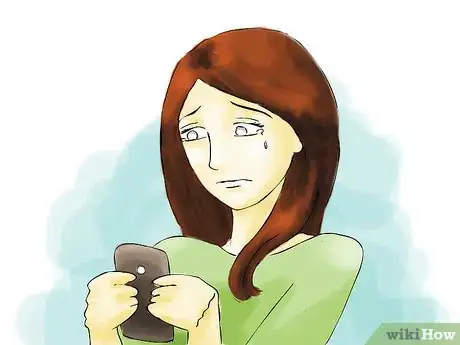

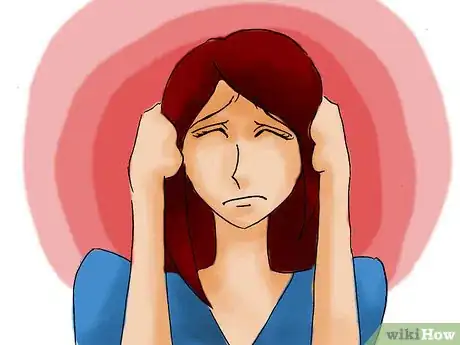
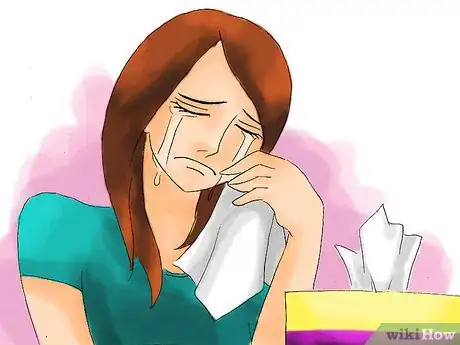
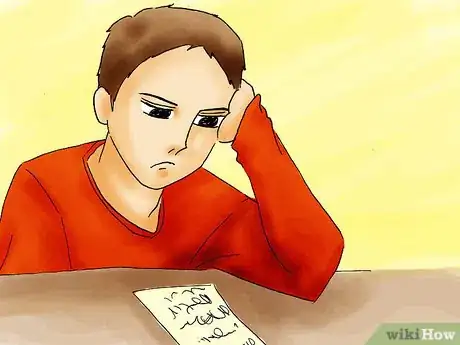

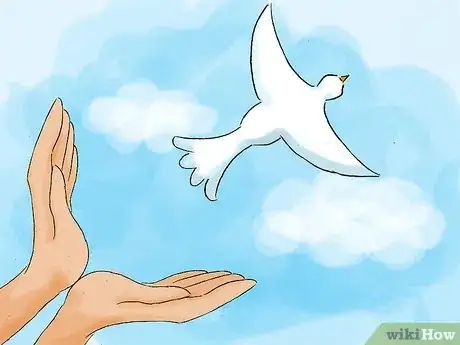
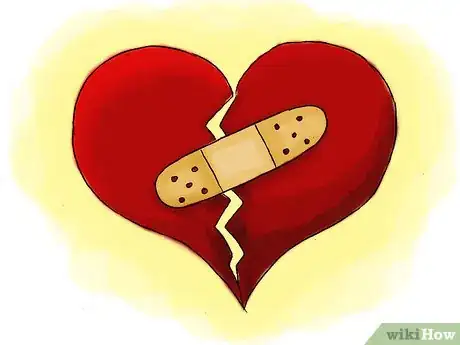

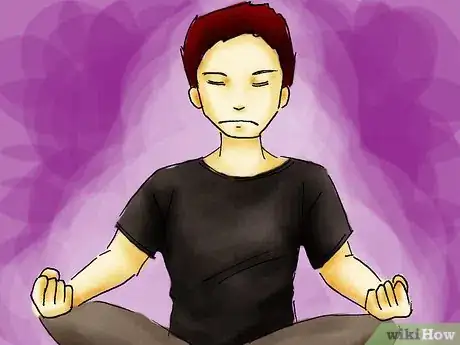


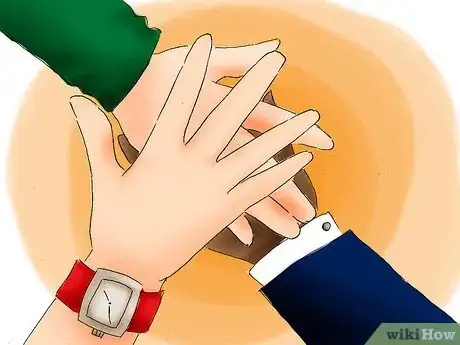
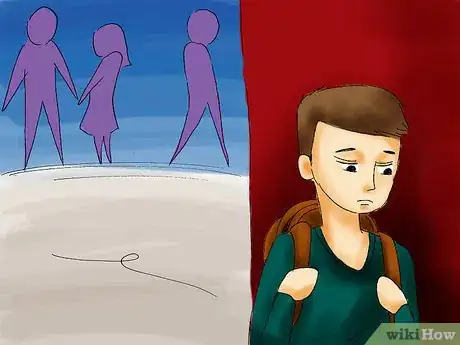

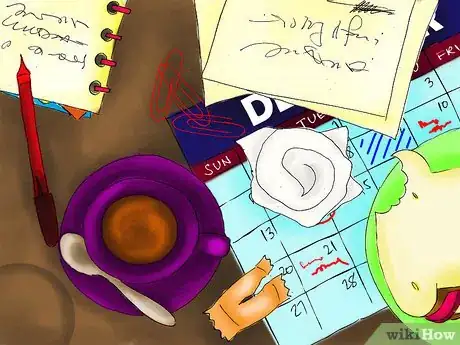
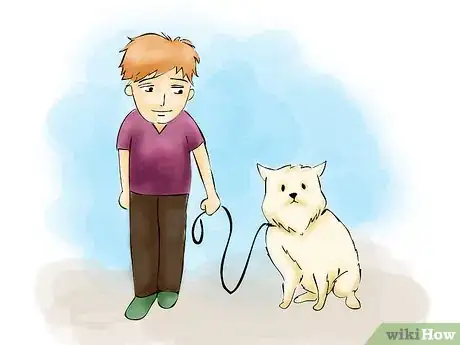



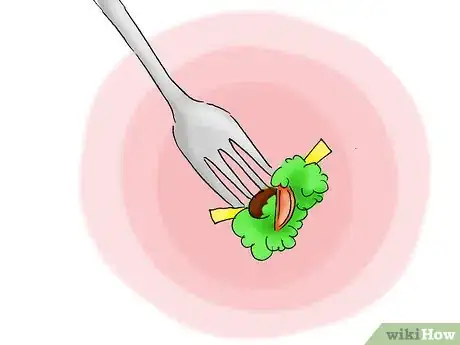






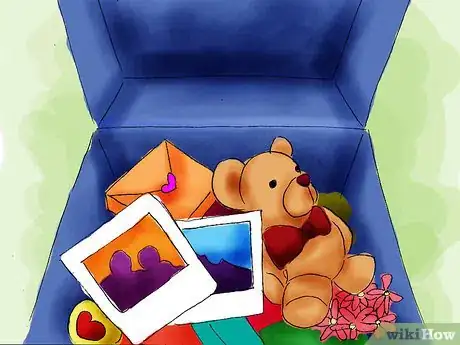

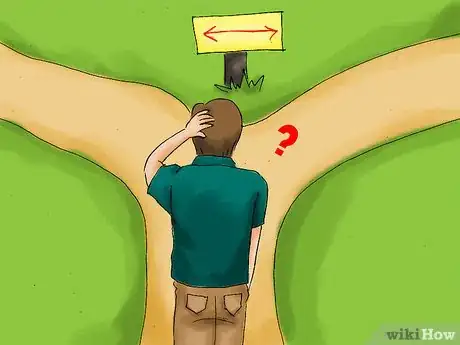





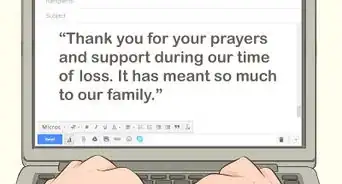


-Step-20-Version-2.webp)







